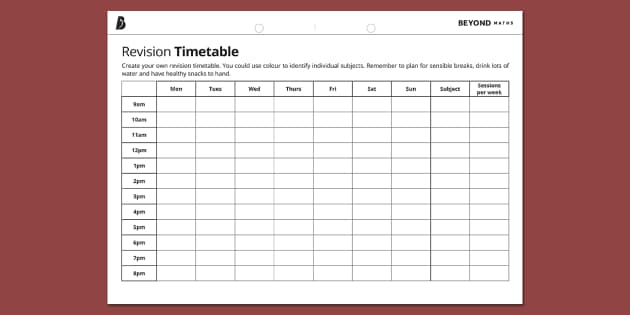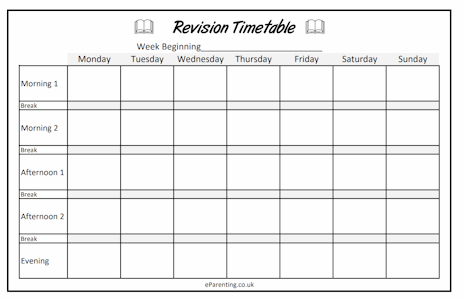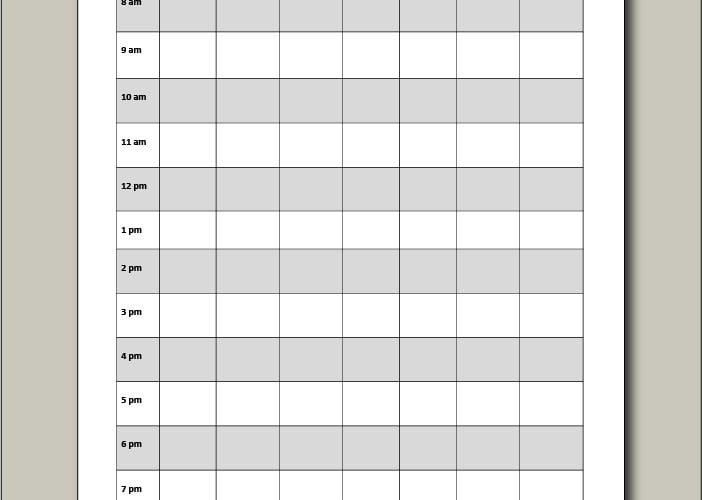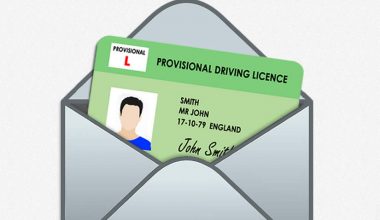Students can tailor their plan to fit around their everyday lives and their priorities by using A Level revision timetable. To optimize study efficacy, different subjects and topics can be identified with color, and logical break times can be planned!
Utilizing the highly efficient A Level revision timetable will provide the foundation for a solid study platform. Students can create their timetable using the days, time intervals, subjects, and sessions per week columns and include it in a poster or standard format.
The A Level revision timetable also includes an alternate version that allows students to create their own time intervals if their schedules are more precise. For instance, individuals might prefer setting aside 45-minute blocks to study math instead of one-hour chunks to better fit their learning styles.
Let’s see how you can create your own A level revision timetable.
Table of Contents
- Creating Your Own A Level Revision Timetable
- A-Level Revision Timetable (That Actually Works)
- Making a Revision Schedule
- Importance of A-Level Revision Timetable
- Beginning Your A Level Revision Timetable
- Apps for A Level Revision Timetables
- Frequently Asked Question on A-Level Revision Timetable
- Conclusion
- References
- Recommendations
Creating Your Own A Level Revision Timetable
Students can create their own A level revision timetables using basic template in accordance with their own needs and objectives. Students can fully customize their study plan to meet their lifestyle by choosing from a variety of styles, black and white versions, and blank-time PDF files that are directly accessible online.
Each of the Level revision timetables has been designed for printing and is color-coded so that distinct subjects/topics and study objectives are more easily identified. To enhance the efficiency of the revision sessions, breaks for water, refreshments, and time away from the computer screen can be planned into the program, as shown in the timetable.


See also: Do BTECs Have Exams? Exam Timetable & Tips
A-Level Revision Timetable (That Actually Works)
The success of your education (and job) depends greatly on revision timetable. Making the ideal a level revision timetable requires prioritizing difficult subjects, minimizing preparation for easier ones, including pauses, and remaining composed. There are also techniques for your revision that will help in creating good timetable.
1. Choose the Day and Date That Your Revision Timetable Will Begin
The right starting dates are present in all the top revision schedules. Unfortunately, finding the ideal start date is not always easy.
We suggest that you begin your revision about two months before to your first exam. No matter what examinations you’re taking, you should have adequate time to prepare for them by reviewing thoroughly.
Although you may start sooner, you risk forgetting what you revised. Therefore, we advise beginning your study schedule on a Monday morning. That is because it’s a new week, and your brain also believes that Mondays are better days for learning new things. Smiles.
Read Also: How To Manage Time In Exams
2. Include Your Least Favorite Subjects in Your A level Revision Timetable
You should be able to organize and maintain order as you study for your exams with the aid of your revision timetable. Why then would you include topics you detest in it?
When you receive your GCSE results, you’ll discover that having a collection of GCSEs that is balanced is preferable to having certain subjects that are wonderful and others that are… not so amazing.
The same is true for BTEC examinations, A-Level exams, and pretty much all other tests you will ever take. Balanced outcomes are preferred by employers (and pretty much everyone else), as they demonstrate your capacity for hard work in any endeavor.
As a result, you should modify the less favorable subjects more and the favorable subjects less. However, there are tips to study subject you absolutely hate.
3. Include Some Enjoyable Activities in Your A Level Revision Timetable
Revision, according to some, is all labor and no play. Is it possible that’s true?
The answer is unquestionably not. Having fun is crucial to the success of your revision schedule, just like taking pauses.
Your motivation will crash if you don’t include some enjoyable things in your revising calendar. That has happened to us several times during really awkward revising times.
We’ve discovered that a few enjoyable events each month help me cope with the overwhelming load of revision timetables.
Just frequently enough to maintain your sanity while your revision schedule is in action, not too frequently. Just keep in mind that once your exams are through, you may go out and party all you want.
You should however know how to motivate yourself to revise for your A level.
See also: How To Study For The ACT In Less Time | 2024 Timetable, Schedules
4. Know Your Learning Style
Your revision schedule is a terrific tool for helping you stay on track with your studying and getting ready for your exams, whenever they may be. However, if you don’t successfully modify, it won’t function.
You won’t be able to use your revision schedule effectively if you don’t know what type of learner you are.
The three main learning styles are visual, aural, and tactile. Everyone ought to fit into one of these three categories; else, you might be an alien.
Images, photos, and colors are the ideal teaching tools for visual learners. Use flashcards or other comparable tools to accelerate your learning if you learn best visually.
Hearing the numbers and data they need to know is advantageous for auditory learners. They function best when listened to on podcasts, watched on videos, or heard from professors. Hands-on learning is more effective for those who are physical learners.
Making a Revision Schedule
To make a revision schedule, you need to make a list of all the things you need to edit.
Sounds simple enough, no? Once you’ve listed every subject you’re being tested on, though, don’t stop there; segment the list into distinct modules, units, or topics. This breaks the process down into manageable pieces and establishes clear objectives for each revision session. It will also simplify the process of prioritizing.
It may be helpful to consult the course description or the contents page of your course manual when breaking up the topics. These will help you divide the topic. Additionally, by consulting the syllabus, you can avoid wasting time on subjects that won’t be covered in the test.
See More: Top 15 Best Online GCSE Courses in 2024
Importance of A-Level Revision Timetable
The secret to acing your exams is a well-planned review schedule. Additionally, it simplifies everything into smaller, easier-to-manage portions, making editing considerably less daunting.
1. Make Your Topics a Priority
Have you ever found yourself writing on a subject you are confident in when you know in your heart that you ought to be concentrating on another one that is challenging? Yes? Not by yourself. In actuality, choosing the route with the least amount of resistance is a very human instinct. Since it’s human nature, there’s no shame in it, but we must face it when organizing our rewrite.
When creating your calendar, schedule your most challenging subjects for earlier rather than later. Sort your list of topics from those you are least to most confident with.
It can be tempting to put off revision and focus on the areas you find simplest first, but doing so increases the likelihood that you won’t have enough time to fully comprehend the harder issues and consult experts.
Give yourself extra time to understand your hardest subjects, but don’t ignore your best ones. As an illustration, you might opt to spend two hours on a challenging unit for every hour you spend on a simpler one. Even though it can feel like you already know everything, by the time the practice exams arrive, you might not!
2. Calculate the Amount of Time You Have to Revise
Depending on the dates of your tests, this will change. You don’t need to bother about counting your hours precisely; the number of days will do.
Simply type “How many days until [insert exam date]” into the search bar on your browser, and it will handle the rest. Use a rough date that should fall before your mocks begin if you don’t yet know the actual dates; for instance, the Sunday before mock week.
Using your prioritized subject list and exam timetable, pace your schedule by prioritizing the hardest and most time-sensitive subjects first. If not, stay to the list you already created with priorities.
See also: Can You Drop an A Level in Year 12? When Is It Too Late to Change A-Level Subjects?
3. Remove all Commitments
Make sure to include your school schedule, extracurricular activities, and any other events (such as meals, getting together with friends, holidays) in your plan. Make sure to include those days in the plan as well if you wish to completely avoid revision on any certain days, such as Saturdays or a family birthday.
For the purpose of revision, you don’t have to fully forgo downtime. By making plans thus far in advance, you may ideally avoid burnout and have enough time for a healthy work-life balance. Taking a break will help you work better in the long run. These are just mocks, at the end of the day!
4. Create a Schedule
It’s time to talk about the timetable, which is why we’re all here in the first place. You may schedule your study sessions around your non-negotiables now that you have them in place.
Divide the total number of topics you need to review by the number of days you have left until your first exam (after any days you won’t be studying). You may determine how many topics you need to review each day from this.
You would need to cover two subjects per day if you had 60 topics and 30 days to cover them. Remember to keep this in mind. You might also wish to review all of the material you covered in class a few days before each exam.
Keep in mind that you have a home advantage because you are familiar with your preferred working methods. Put the subjects you’ll need to give your complete focus to when you’re most productive. You could find it more convenient to schedule particular time periods for each subject, or you might choose to schedule daily chores related to each subject.
Read Related Post: How to Get a Degree Without Going to University
Referring to your rankings as necessary, maintain a healthy balance between your more challenging and familiar themes.
In this manner, you invest the necessary time while also gaining access to certain quick(er) victories. You may develop momentum and maintain motivation by working efficiently and observing the results of your efforts.
Beginning Your A Level Revision Timetable
A calendar is essentially what a simple revision timetable is. However, it contains themes and subjects you need to review on particular days rather than occasions like vacations and birthdays. You really don’t need to deviate much from this extremely straightforward model:
Calculate the number of revision days you have remaining before your examinations.
Determine how much time you will dedicate to revision each day.
Identify all of the examinations you need to study for.
Share the amount of time available for each subject’s or exam’s revision.
Once you’ve established the fundamental schedule, you can begin topicalizing the subject timings. Then, you may adjust it to fit your personal learning style (by, for example, concentrating more on one particular subject and less on another). See more below on that.
You’ll have greater freedom over where you can study if you can access your schedule on the move (using something like Google Docs or an app; see some app suggestions below).
See also: How Many Hours of Revision A Day For A Levels
Apps for A Level Revision Timetables
You can plan and organize your revision timetable with the help of these three well-known apps. Along with other tools to keep you motivated, they offer study schedule templates for you to start with.
These apps are My Study Life, SQA My Study Plan, and Timetable.
My Study Life is a mobile application that you can use all year long, not only when you’re revising. Keep a record of your daily and weekly schedule as well as your homework and assignments. For simple access across different devices, everything is stored on the Cloud. accessible via iTunes and the Play Store.
You can import your exam schedule directly from SQA MyExams into the SQA My Study Plan app, which was developed by the Scottish Qualification Authority for Scottish students. The program provides a customised study schedule depending on when your exams occur. accessible via iTunes and the Play Store.
If you’re an Android user, Timetable is a tool you may use to organize your time spent in school across all of your devices. Additionally, in case you forget, the software mutes your phone while you’re in class. Accessible from the Play Store.
Also check this post: Can You Do A Levels Without GCSE | All You Need To Know
Frequently Asked Question on A-Level Revision Timetable
The day before your exam, you should theoretically spend two hours reviewing. That should give you plenty of time to refine your exam technique and pass those exams. If taking breaks on the weekends is more convenient for you, you should extend each day’s revision session by a small amount.
Revise a subject, then go back to it the following day, three days later, and seven days later. It is believed that your brain will recall knowledge better if you give it this amount of time. This could be the technique for you if you prefer to complete your revision online.
Timing is important. Too much revision time might result in boredom and fatigue, while too little revision time can result in stress and last-minute cramming. It is typically advised that students start their A-level revision three to four months prior to the exams.
Plan how many hours you’ll devote each week to revision after giving yourself a minimum of four weeks or longer to complete it. The quantity of questions in the exam kit should be divided by the number of weeks you intend to study for the exam. This is a helpful strategy.
Conclusion
It’s acceptable if you would rather create a hand-drawn A level revision timetable. However, a digital one might be more practical for you.
You may always have your revision schedule with you by using timetable apps. It’s also far simpler to make adjustments to a digital schedule than a written one when flexibility is required.
References
- twinkl.com.ng – A Level Revision Timetable
- pmt.education – How to make a revision timetable you’ll actually use!
- thinkstudent.co.uk – How To Make A Revision Timetable (That Actually Works)






